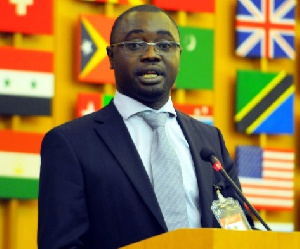 Mr. Samuel Afari Dartey, CEO - Forestry Commission
Mr. Samuel Afari Dartey, CEO - Forestry Commission
The forestry sector’s contribution to the country’s economy has dwindled during the last six years due to inadequate investment in to the sector, the Chief Executive Officer (CEO) of the Forestry Commission Mr. Samuel Afari Dartey has said.
The forestry sector’s contribution to Gross Domestic Products (GDP) declined from six percent to about two percent during the period.
B&FT has been informed that the country’s forest cover has declined from 8 million hectares to about 4.94 million hectares between the period of 1990 till present, and it is expected that 50 percent of the current forest cover could be lost by 2050 if the country neglects adequate investment into the sector.
The sector used to employ over an over-200,000 workforce but has been reduced to employing less than 120,000 people, while its provided livelihoods for about 3.6 million Ghanaian as at 2012 figure.
A decline in the sector performance indicates a fall in the livelihoods of rural dwellers, as approximately 70 percent of the country’s rural dwellers are believed to depend on the forest for their energy needs and livelihood.
Mr. Dartey who was speaking in Accra under the theme ‘Forests, Investment Opportunities, and Climate Change’ explained: “We have a problem here, where there is incomplete capture of the full value of forest resources to the GDP, or the full value of the forestry sector’s contribution in our national accounts.
“We also have strong performance of some parts of the forestry sector that weren’t featured when it contributed significantly to the GDP.
“Cocoa contributed very well during the last 10 years, with increases in volume and revenue to the economy. Investment in plantation development has still not been captured in the national accounts.” Mr. Dartey explained that it has become extremely difficult for government to finance development projects in the sector, making the industry rely largely on the private sector for survival.
This situation, he said, has affected the country’s ability to develop its eco-tourism sector; adding that the country has lost huge revenue from international tourism to countries like Kenya, Rwanda and Zambia.
He said that ecosystem services rendered to the state by the Forestry Commission are not being paid for by the government, adding: “We need to develop our ecosystem as a nation”.
The Commission, he said, has developed about 100,000 hectares of plantation -- but their maintenance has been a challenge because of limited resources.
Director-General of the Centre for Industrial and Scientific Research (CSIR), Dr. Victor K. Agyemang, warned that if concrete steps are not taken to address the sector’s poor performance, the nation could face food shortages.
This, he said, would automatically lead to increases in the prices of food and further worsen the plight of Ghanaians in the near-future.
Director of the Institute for Environment and Sanitation Studies of the University of Ghana (UG), Prof. Chris Gordon -- who highlighted the impact of climate change on national development, urged government to take urgent steps to halt climate change in the country.
“Ghana is experiencing climate change because government is not financing the Forestry Commission and other forest protection agencies to work adequately.
“We need to think about the welfare of future generations who are likely to become climate change refugees in their own country,” he said.
Prof. Gordon also called on government to put measures in place to tackle sand-winning along beaches across the country.